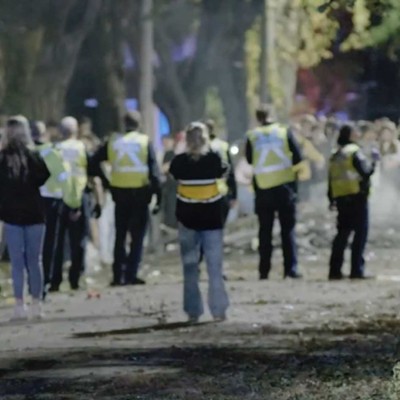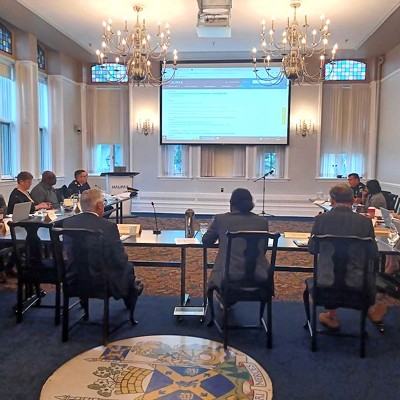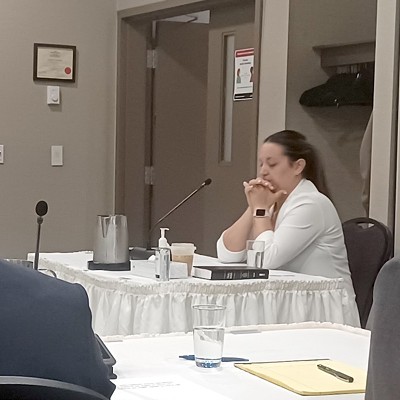This article appeared under a different headline when originally published. The first paragraph below has been contradicted by official spokesperson, but none of the rest of the article
A source tells The Coast that deputy police chief Chris McNeil, who has been suspended pending an investigation, will not return to the Halifax Regional Police Department. The source says there have been two investigations into McNeil, one to determine if he violated the criminal code, the second to determine if he violated the Police Act; the criminal investigation is complete, but the Police Act investigation continues.
This is a long and involved tale, so follow the ball closely. First, the backdrop:
The McNeil investigations are related to a private security firm called Integrity Personnel Screening and Interviewing Consultants, which had been performing lie detector tests of recruits into the fire department. Reportedly, recruits were asked a range of questions, including offensive queries about their possible penchant for bestiality. The firm did other work for the police department as well, and it’s that other work that concerns us, as we’ll soon see.
Integrity was awarded the fire department work without having to go through a competitive bidding process. The company was co-owned by two police officers, Mark Hartlen and Darrell Gaudet, and another officer, Anthony McNeil, did work for the firm. Anthony McNeil is Chris McNeil’s brother.
After the no-bid contracts become public knowledge, Hartlen was demoted (curiously, no action was taken against Gaudet, who is now a watch commander with the department). Hartlen is contesting that demotion before the Police Complaints Commission, and I’m told that last November he gave testimony related to the Integrity contracts. It was at that time, I’m told, that McNeil gave testimony related to his brother’s work with the company, and it is that testimony which subsequently got Chris McNeil suspended pending the outcome of the on-going investigation.
Another source tells me that the investigation is looking at Anthony McNeil’s involvement, as an employee of Integrity, with an IP search meant to track down the origins of a racist newsletter spread in fire stations. Because that IP search was conducted improperly, the author of the newsletter could not be disciplined. Wrote one investigator:
Management was advised by the officer that without a warrant the internet provider would not release the address, and that the way the address had originally been obtained, it could not be used.The suggestion here is that the IP search was illegal. If so, it is a serious breach of conduct by a police officer.
To recap: a racist incident in the fire department and a no-bid contract to a company owned by police officers appears to be related to not one, not two, not three, not four, but five different investigations into the city bureaucracy. I’d lose you if I detailed all of these, but the investigations are as follows:
- The investigation into fire department racism, conducted by Integrity.
- The investigation of the fire department investigation, conducted by Maureen Shebib, a former human rights commissioner hired by the city to look into fire department racism
- The investigation into the improper IP search, initiated by Hartlan’s testimony before the Police Complaints Commission
- The criminal investigation into Chris McNeil’s testimony before the Police Complaints Commission, conducted by the Halifax Regional Police Department
- The investigation into possible Police Act violations by McNeil, presumably conducted by the Police Complaints Commission, although I have not verified that
And today, all of this comes back in the news, first because we’re told of
Michael Tutton, a reporter with the Canadian Press, has been doing outstanding work dogging the Halifax Regional Police Department’s investigations. He has been bird-dogging the investigation of McNeil. Tutton writes:
In March, The Canadian Press applied under access to information legislation for records of Halifax police officers involved in a private lie-detector company, including records that indicate whether any officers were in breach of the police department’s rules on outside employment and whether discipline was meted out.
The police department rejected Tutton’s request, and Tutton appealed that decision to Dulcie McCallum, the province’s Freedom of Information officer. Acting with uncharacteristic speed, McCallum decided to immediately review the case, and asked the police department for the records so she could review them to determine if they were covered by the Freedom of Information and Protection of Privacy Act. But, with unprecedented chutzpah, the police refused to turn the documents over.
Make no mistake: this refusal to turn over documents to the review officer is affront to the entire freedom of information process. Democratic control of government is at stake. Continues Tutton:
Darce Fardy, the president of the Right to Know Coalition of Nova Scotia, said the police position could hinder McCallum’s ability to do her job.And how are our elected officials reacting to the police department’s refusal to engage the law? With a big shrug.Fardy, who was the province’s review officer for 11 years, said he was never refused the right to review documents, including confidential cabinet documents, to determine whether they were exempt under freedom of information legislation.
"I think the whole position of review officer will be compromised if all the relevant documents weren’t released to the review officer. That’s what the job is all about."
“It’s an operational issue,” says mayor Peter Kelly, who sits on the Board of Police Commissioners. “ If the chief feels that there is a reason not to disclose, then there must be some ability (sic) to it.”
But as someone sitting on the Board of Police Commissions, isn’t it Kelly’s job to oversee and sometimes overturn the decisions of the management at the police department?
“Only if there’s a reason to do so, and I don’t see a reason to do so.”
Councillor Steve Streatch, who also sits on the Board of Police Commissioners, echoed Kelly’s opinion.
“We did discuss this at the police commission,” says Streatch. “ I am aware of the situation you’re referring to. I do support the decision of the chief; it’s within his purview to decide.”
Streatch wouldn’t give particulars, but acknowledged that the investigation involved Chris McNeil, and said it would be resolved “soon.”
Councillor Sue Uteck, who also sits on the Board of Police Commissioners, is out of the country and unavailable for comment.













